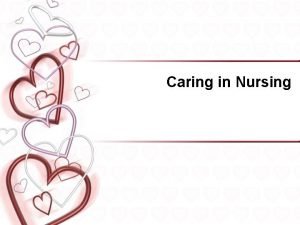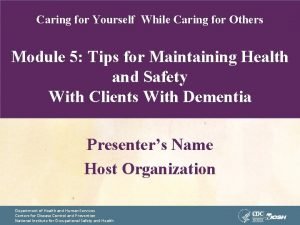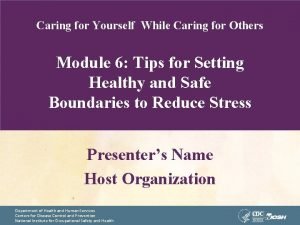Caring and Employment How caring impacts on employment















- Slides: 15

Caring and Employment How caring impacts on employment Sue Mc. Lintock Carers Scotland

Caring and working in Scotland A reminder of why this is important…… • • • @ 270, 000 combining work and care @ 1 in 8 carers in the workplace Population getting older and we’re all working longer By 2035, 50% more carers across the UK Therefore more working carers… 90% of working carers are over 30 Peak age for caring between 45 – 64 Employees with valuable skills/experience Without support carers may give up work…. . Supporting working carers is important for carers, their families, employers and society

Opportunities and challenges ü Financial stability/security ü Career fulfilment ü Positive mental health ü Social interaction ü A life outside of caring ü Good for employers Ø Pressures of balancing work and care Ø Tiredness, anxiety and stress Ø Impact on career progression Ø Isolation in the workplace

Impact of caring • 45% of carers had given up work because of caring (Prepared to Care 2013) • 42% had reduced their working hours • 34% said caring negatively affected their chance of promotion • 60% had reduced incomes • 63% were unprepared for the impact that caring had on their career • 71% have felt lonely or isolated in the workplace (State of Caring 2014) • 43% felt that colleagues and managers did not understand the impact of caring • 38% had not felt comfortable talking about their caring responsibilities at work • 56% of the carers who had given up work to care highlighted the stress of juggling work and care

“ 2017 was a very difficult year for me. I was the main carer for my mother who was suffering from advanced stomach cancer and my father who has vascular dementia. I was really struggling to keep up with my academic responsibilities as well as care for my parents. Many nights I was awake until 4 am caring for my mother and then travelling to work for 9 am to deliver lectures and write research grant applications for the appropriate deadlines. It came to a head when one day at work I just couldn’t stop crying and I realised that I needed help” Being able to work for me is of the upmost importance for my positive mental health, as it allows me to have time away from home and the pressures of the support that comes with being a carer. It allows me to uses the skills I have developed through study and gained within the workplace to do the job I am skilled to do. Without the support I have received from my employer, this would not be possible.

Key aims : ü Raise awareness of the growing numbers of people who juggle work and caring ü Encourage employers to understand the business case for supporting carers in the workplace ü Recognise employers who have policies and practices which support carers

Identification ü Different methods of identification – formal and informal ü Helps staff recognise themselves as carers ü Enables them to tell their employer and ask for support (but recognises it is also their choice not to) ü Helps employers understand their workforce and put measures into place

Policies ü Important to recognise carers within workplace policies ü Helps employees and managers know how they are supported ü Clarifies leave provisions, flexible working options etc ü Helps ensure consistency across an organisation ü Reinforces that an employer values and supports carers

Practical support ü Health and wellbeing support – EAP schemes, Healthy Working Lives etc… ü Signposting to external support – information resources, local carers centres, support groups etc ü Telephone calls, parking, internet access ü Small changes can make a big difference – lots of examples

Awareness & communication ü ü ü Create a culture of support across the organisation May be good policies but how do people know? Channels of communication to reach all staff Senior level buy-in and endorsement Line manager training to ensure consistency Plenty options for awareness raising during Carers Week, Carers Rights Day etc

Peer support ü ü ü Connects carers with other carers Helps reduce loneliness and isolation Raises awareness of workplace policies and support Helps employers develop support for carers Carers share experiences, hints and tips from outside the workplace ü Can bring in external experts and agencies ü A safe place to simply have a chat, cry or laugh

3 things to lessen the impact As a carer: 1. Tell your employer that you are a carer and talk to them about how they can support you – Flexible working/carers leave/peer support etc 2. Talk to colleagues, friends and family about how they can support you 3. Talk to your local carers centre or support group

3 things to lessen the impact As an employer: 1. Raise awareness in the workplace and encourage carers to identify themselves 2. Talk to your employees about how you can support them – Flexible working/carers leave/peer support etc 3. Make links with local carers centres or support groups

Support and resources • Online/telephone/ • face-to-face support • Website links and resources • Good practice examples from participating organisations • Case study videos • Sample policies/processes • Signposting to/partnerships with external carers support services

Further information • Website: www. carerpositive. org • Email: sue@carerpositive. org / sue. mclintock@carerscotland. org • Telephone: 0141 445 3070
 Dr. jean watson
Dr. jean watson Positive and negative impacts of materials technology
Positive and negative impacts of materials technology Positive impacts of information technology
Positive impacts of information technology Material technology positive and negative impacts
Material technology positive and negative impacts Nsf grfp results
Nsf grfp results Positive effects of information technology
Positive effects of information technology Ecotourism advantages
Ecotourism advantages Social impact of ict
Social impact of ict Putting-out system
Putting-out system Role of gaa in irish life
Role of gaa in irish life Haitian revolution causes
Haitian revolution causes Negative social impacts of tourism
Negative social impacts of tourism Positive impacts of tourism in scotland
Positive impacts of tourism in scotland Meaning of ict
Meaning of ict What causes inflation
What causes inflation Industrial revolution effects
Industrial revolution effects




























